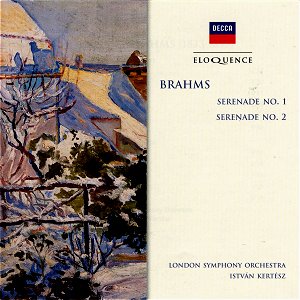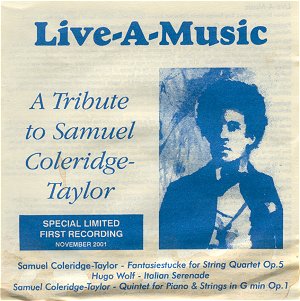 Composer: Johannes Brahms
Composer: Johannes Brahms
Works: Serenades Opp. 11 and 16
Performers: London Symphony Orchestra, Istvan Kertesz
Recording: ELOQUENCE DECCA 466 672-2
Label: Decca
Brahms’s Serenades, particularly the two included in this disc, serve as essential milestones in the composer’s early orchestral output. Composed when Brahms was still establishing his reputation, these works reflect a youthful exuberance tempered by a deep sensibility that would characterize his later masterpieces. The First Serenade, Op. 11, was initially conceived as a chamber work before Brahms expanded it to orchestral form, while the Second Serenade, Op. 16, showcases his burgeoning mastery of orchestral color and texture. This recording, conducted by the tragically short-lived Istvan Kertesz with the London Symphony Orchestra from 1968, captures the vibrancy and freshness of these early compositions, making it a vital addition to any Brahms enthusiast’s collection.
Kertesz’s interpretation is marked by a remarkable balance between lyrical warmth and structural integrity. The opening of the First Serenade is particularly striking; the rustic horns announce a pastoral theme that is both inviting and rich in character. Kertesz’s deft conducting style allows the LSO brass to project with a natural authenticity, ensuring that the ensemble’s sound is neither overbearing nor overly polished. This balance is maintained throughout the work, particularly in the Adagio non troppo, where the expansive melodic lines unfold gracefully, showcasing a depth of feeling that never veers into sentimentality. The movement’s intensity is carefully calibrated, enhancing the overall cohesion of the piece without overshadowing its individual sections.
The Scherzo of the First Serenade further illustrates Kertesz’s interpretative choices, as the swirling violins create a lively dance, underscored by a resolute horn passage. This interplay between the sections of the orchestra reveals Kertesz’s acute attention to detail and orchestral dialogue, a hallmark of his conducting style. The Second Serenade, in contrast, is a more intimate affair, devoid of violins but resplendent in its orchestral textures. The central adagio is a highlight, drenched in a melting beauty that Kertesz brings to life with an elegant touch. The bustling outer movements are equally captivating, characterized by their infectious energy and rhythmic vitality, deftly handled by the LSO’s players.
From an engineering perspective, the sound quality of this recording is commendable, offering a vivid yet natural representation of the orchestra. The sonic balance allows for an appreciation of the intricate orchestral fabric, with woodwinds and brass clearly delineated against the lush string backdrop. The recording avoids the pitfalls of excessive brightness, instead providing a warm and inviting auditory experience that complements the music’s character.
Kertesz’s interpretations remain unmatched, even decades after their initial release, standing favorably alongside other notable recordings of these works, such as those conducted by Herbert von Karajan and Claudio Abbado. The depth of emotional engagement and technical precision exhibited here offers a compelling argument for why this disc continues to resonate with audiences and critics alike.
The Eloquence series has done well to reintroduce these performances to a new generation of listeners. Kertesz’s blend of warmth and rigor, combined with the LSO’s period of excellence, results in readings of Brahms’s Serenades that are not only historically significant but also deeply satisfying. This recording is a testament to the enduring power of Brahms’s music and the exceptional artistry of those who interpret it.


